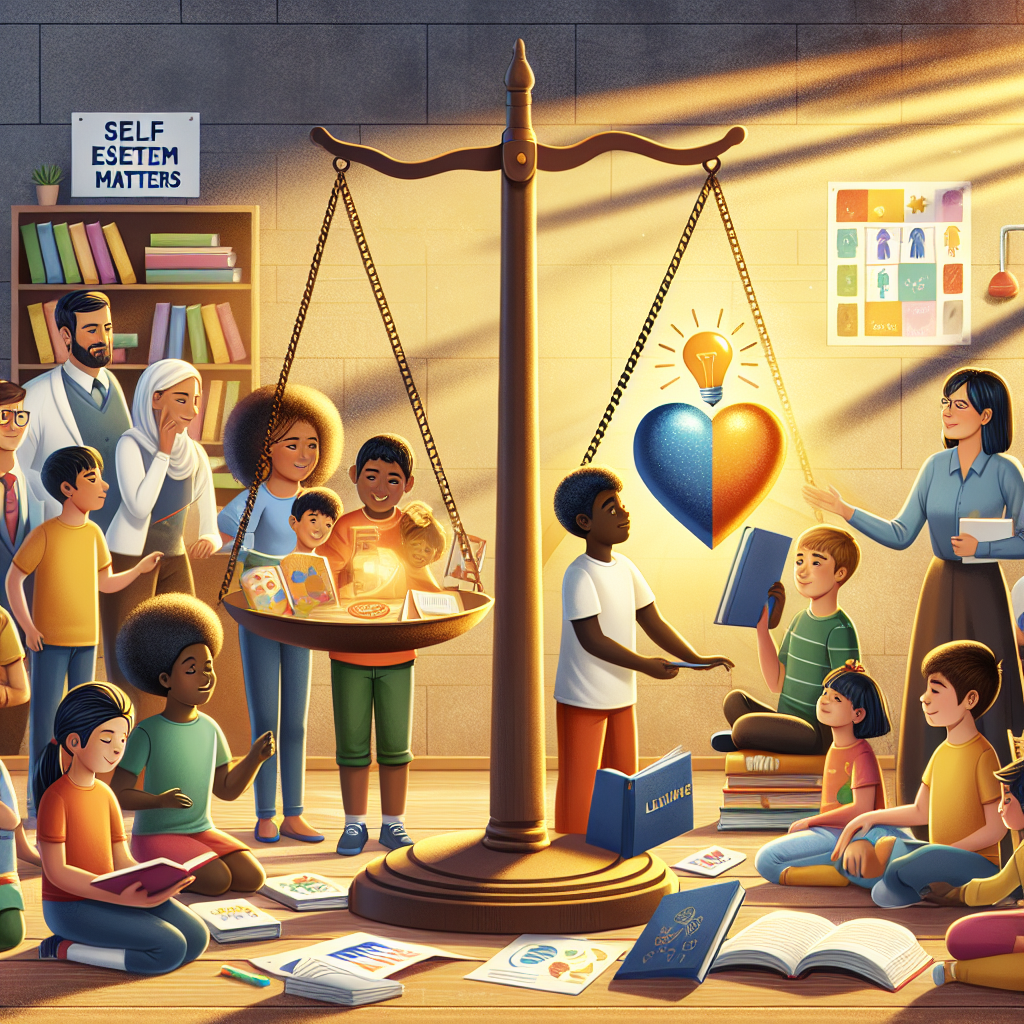
Self-Esteem Matters: Supporting Kids with Learning Disabilities to Thrive
Introduction
Imagine being a child filled with dreams and aspirations but feeling trapped by difficulties that others seem to navigate effortlessly. For children with learning disabilities, this struggle can impact not only their academic performance but also their self-esteem. Focused support in enhancing their self-esteem is paramount in helping these children thrive. In this exploration, "Self-Esteem Matters: Supporting Kids with Learning Disabilities to Thrive," we will delve into effective strategies, heartwarming case studies, and engaging insights that can make a remarkable difference in their lives.
Understanding Learning Disabilities and Their Impact on Self-Esteem
Learning disabilities (LD) affect the way children process information, making tasks such as reading, writing, or math particularly challenging. According to the National Center for Learning Disabilities, nearly 1 in 5 children in the U.S. has learning and attention issues. These difficulties can lead to feelings of inadequacy and ultimately harm a child’s self-esteem. When children feel they are constantly battling against their peers, they may start to doubt their abilities, leading to a vicious cycle of low confidence and poor performance.
Effects of Low Self-Esteem on Children with LD
Academic Struggles: Many children with learning disabilities face academic challenges, and repeated failures can severely impact their self-image.
Social Isolation: Difficulties in communication and interaction can lead to withdrawal from social activities, making it harder to build friendships.
- Emotional Issues: Low self-esteem can lead to anxiety, depression, and behavioral problems, making it crucial to address these concerns early on.
Strategies for Supporting Self-Esteem in Kids with Learning Disabilities
Creating a supportive environment that nurtures self-esteem is essential. Here are some proven strategies that can guide caregivers, educators, and parents in their efforts.
1. Celebrate Successes, No Matter How Small
Case Study: Jacob’s Journey
Jacob, a 10-year-old diagnosed with dyslexia, often struggled with reading aloud in class. Instead of focusing on his difficulties, his teacher began celebrating small wins, such as recognizing when he read a full paragraph without hesitation. This approach gradually built Jacob’s confidence, leading him to participate more actively in class.
Analysis: This example underscores the importance of recognition. Celebrating achievements, even minor ones, can offer children with learning disabilities a sense of accomplishment and bolster their self-esteem.
2. Encourage Open Communication
People often compare their experiences, but children with learning disabilities rarely express their feelings of inadequacy. Encouraging open communication allows them to articulate their challenges.
Techniques to Implement:
- Regular one-on-one check-ins.
- Open-ended questions to explore feelings.
- Non-judgmental listening to foster trust.
3. Set Realistic Goals
Helping children set achievable and personalized goals fosters a sense of ownership and accomplishment.
Example: Instead of aiming for an A in math, a child might focus on improving their grade by just one letter. The process of working toward smaller, realistic goals can provide the necessary encouragement.
4. Foster a Growth Mindset
Teaching kids about growth mindsets can empower them to perceive challenges as opportunities for growth rather than insurmountable barriers.
Case Study: Sarah’s Growth
Sarah, a student with ADHD, initially struggled with mathematics but learned that perseverance leads to mastery. Her parents introduced her to books that emphasized resilience. Over time, Sarah’s perception shifted, allowing her to see setbacks as part of her learning journey.
Analysis: By fostering a growth mindset, we can help children with learning disabilities view their challenges in a positive light and improve their overall self-esteem.
5. Create Supportive Learning Environments
Educators and parents must work together to create an engaging, supportive learning environment tailored to each child’s needs.
Strategies:
- Utilize Multi-Sensory Teaching Techniques.
- Provide Frequent Feedback.
- Incorporate Technology.
Drawing on various resources not only aids in their learning process but also helps them feel more engaged and valued.
The Role of Peers in Building Self-Esteem
Peer relationships are a powerful influence on children’s self-perception. Programs that focus on building friendships among children with learning disabilities have shown promising results.
Peer Support Programs
Example: A peer buddy program at a local elementary school matched children with learning disabilities with their peers. The initiative not only improved social dynamics but also helped build mutual understanding and respect among students.
Benefits:
- Develops empathy in peers.
- Reduces feelings of isolation for those with learning disabilities.
Engaging Parents and Caregivers
Parents play a crucial role in shaping their children’s self-esteem. Engaging parents in the educational journey can lead to better outcomes.
Workshops and Resources
Creating workshops or providing resources on how to support children at home can significantly uplift their spirits. For instance, a workshop on positive language can equip parents with tools to encourage their kids effectively.
The Importance of Professional Support
In some cases, seeking professional help can be incredibly beneficial. Therapists, psychologists, and educators who specialize in learning disabilities can provide tailored approaches that make a difference.
Building Resilience Through Therapy
Case Study: Tim’s Transformation
Tim, who faced low self-esteem due to struggles in school, started seeing a child psychologist. The therapist used cognitive-behavioral techniques to help Tim reshape his thoughts about failure. Over time, Tim learned to approach challenges with a more positive attitude, significantly enhancing his self-esteem.
Analysis: Professional intervention highlights that outside support can be a game-changer for children dealing with emotional distress tied to learning disabilities.
Utilizing Technology
In our digital age, technology has become a pivotal resource for enhancing self-esteem in children with learning disabilities.
Educational Apps and Tools
There are numerous educational tools available that cater to different learning preferences, offering interactive and engaging ways to learn.
Benefits:
- Boosts engagement through game-like learning.
- Provides instant feedback, enhancing motivation.
Online Communities
Establishing connections through online platforms can help kids build confidence through shared experiences. These communities provide a support system that can foster well-being.
Conclusion
In the journey of supporting kids with learning disabilities, self-esteem matters profoundly. Recognizing their unique strengths and providing tailored support can truly help these children thrive. As caregivers, educators, and peers, we have an opportunity to make a lasting positive impact. Through our collective efforts, we can create an environment where every child feels valued, capable, and inspired to reach their full potential.
Actionable Takeaways:
- Celebrate small victories with kids.
- Foster open communication about feelings.
- Set realistic and achievable goals.
- Encourage a growth mindset.
- Involve training programs for parents and peers.
FAQs
1. What can teachers do to support students with learning disabilities?
Teachers can celebrate small successes, utilize multi-sensory teaching techniques, and create an inclusive and supportive atmosphere.
2. How can parents help enhance their child’s self-esteem?
Parents can provide positive reinforcement, engage in open discussions about the child’s feelings, and seek educational resources or workshops for guidance.
3. Are there any specific exercises that can help build self-esteem in kids with learning disabilities?
Activities that focus on team-building, creative expression, and problem-solving can significantly aid in enhancing self-esteem.
4. How can children with learning disabilities build social connections?
Encouraging participation in clubs, social skills groups, and activities that involve teamwork can help cultivate friendships and social networks.
5. When should professional help be sought for a child struggling with self-esteem?
If a child shows persistent signs of distress, withdrawal, or if low self-esteem begins affecting their daily life, seeking professional advice is advisable.
By integrating these insights and strategies, we can truly ensure that Self-Esteem Matters: Supporting Kids with Learning Disabilities to Thrive, fostering resilience and a positive self-image among children. Engaging in meaningful dialogues, supportive actions, and compassionate initiatives will pave the way for these wonderful kids to not only succeed academically but to embrace their unique journeys with confidence.













